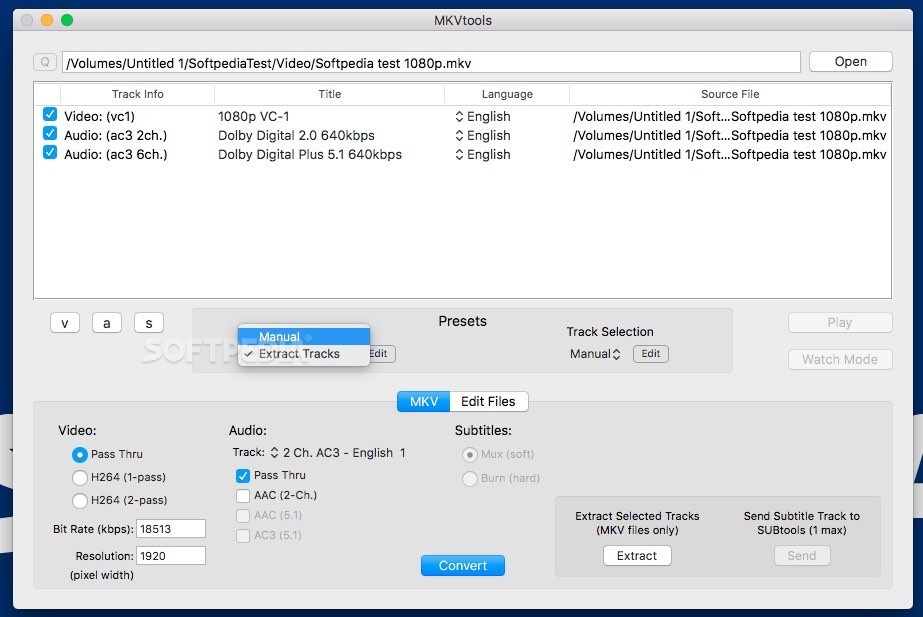

- USING MKVTOOLS TO ADD AUDIO TRACK UPDATE
- USING MKVTOOLS TO ADD AUDIO TRACK PORTABLE
- USING MKVTOOLS TO ADD AUDIO TRACK SOFTWARE
- USING MKVTOOLS TO ADD AUDIO TRACK CODE
- USING MKVTOOLS TO ADD AUDIO TRACK TRIAL
Ad-Supported = The software is bundled with advertising. No installation is required.ĭownload beta = It could be a Beta, RC(Release Candidate) or an Alpha / Nightly / Unstable version of the software.ĭownload 15MB = A direct link to the software download.
USING MKVTOOLS TO ADD AUDIO TRACK PORTABLE
Portable version = A portable/standalone version is available.
USING MKVTOOLS TO ADD AUDIO TRACK TRIAL
Free Trial version available for download and testing with usually a time limit or limited functions. Trialware = Also called shareware or demo.

It may be disabled when installing or after installation.
USING MKVTOOLS TO ADD AUDIO TRACK CODE
Free software Ads = Free Download software and open source code but supported by advertising, usually with a included browser toolbar. Freeware Ads = Download Free software but supported by advertising, usually with a included browser toolbar. Free software Trialware = Download Free software and also open source code but some parts are trial/shareware. Free software = Download Free software and also open source code also known as FOSS (Free and Open Source Software). Freeware Trialware = Download Free software but some parts are trial/shareware. RECENTLY UPDATED = The software has been updated the last 31 days. NO LONGER DEVELOPED = The software hasn't been updated in over 5 years. Type and download NO MORE UPDATES? = The software hasn't been updated in over 2 years.
USING MKVTOOLS TO ADD AUDIO TRACK UPDATE
Version number / Beta version number / Update version number and when it whas released. Sections/Browse similar toolsĮxplanation: NEW SOFTWARE= New tool since your last visit NEW VERSION= New version since your last visit NEW REVIEW= New review since your last visit NEW VERSION= New version Latest version Turn off an MKV video's header removal compression to allow more compatibility with playback and editing.Įxtract the selected tracks from MKV videos as individual video and/or audio files.Īdd jobs to a queue either individually or in batches via drag and drop so you can process multiple files overnight (registered copies only).Īpply one setting to a group of files for easy batch creations (registered copies only).Įnter a "Watch Mode" for which MKVtools will process all videos place in a defined folder (registered copies only). Split MKV videos into segments of a specified file size or by start/end time. Intuitively select desired video, audio and/or subtitle tracks to process, with the ability to verify the selections using video preview.ĭefine presets for one step automated encoding and track selections settings.īurn (i.e., hard code) subtitle tracks into the video, or mux (soft subtitles) from internal tracks or from external subtitle files commonly found on the internet.Ĭontrol the font, size and positioning of the embedded subtitles. Simplified, intuitive user interface that takes the guess work out of processing MKV videos.Ībility to convert various surround sound audio to 5.1 AC3 or 5.1 AAC. The stream must be raw.Convert from a variety of video file formats like MKV, MP4, OGM and AVI into MKV videos.Ĭan convert most videos without having to re-encode the video track and/or the audio track, so processing takes minutes instead of hours and no quality is lost. no MPEG-4, no Matroska, no Ogg containers are possible for external audio. The current architecture of Avidemux doesn't allow to use demuxers ( = modules which extract audio and video streams from containers, which are data structures serving the purpose to hold information about the streams and to link time offsets to an offset within the file) for audio-only files, i.e. QuoteAll of what I do just involves muxing and demuxing as far as I'm aware, why are external audio tracks treated so strangely? Such a sequence can be written to a mass storage device or be kept purely in memory, completely content-agnostic. A file is a sequence of bytes which can be accessed using the file API (usually allowing some basic stuff like seeking to an offset, but not necessarily). QuoteYou still need a container of some kind for it to be considered a file no?Ībsolutely unrelated things, so no, absolutely not.

AAC frames (short portions of audio signal compressed with the AAC codec) without any container structures around them. The file would be either a raw or an ADTS encapsulated AAC stream then, i.e. I'm not sure I understand, what type of file would you get with raw AAC.?


 0 kommentar(er)
0 kommentar(er)
